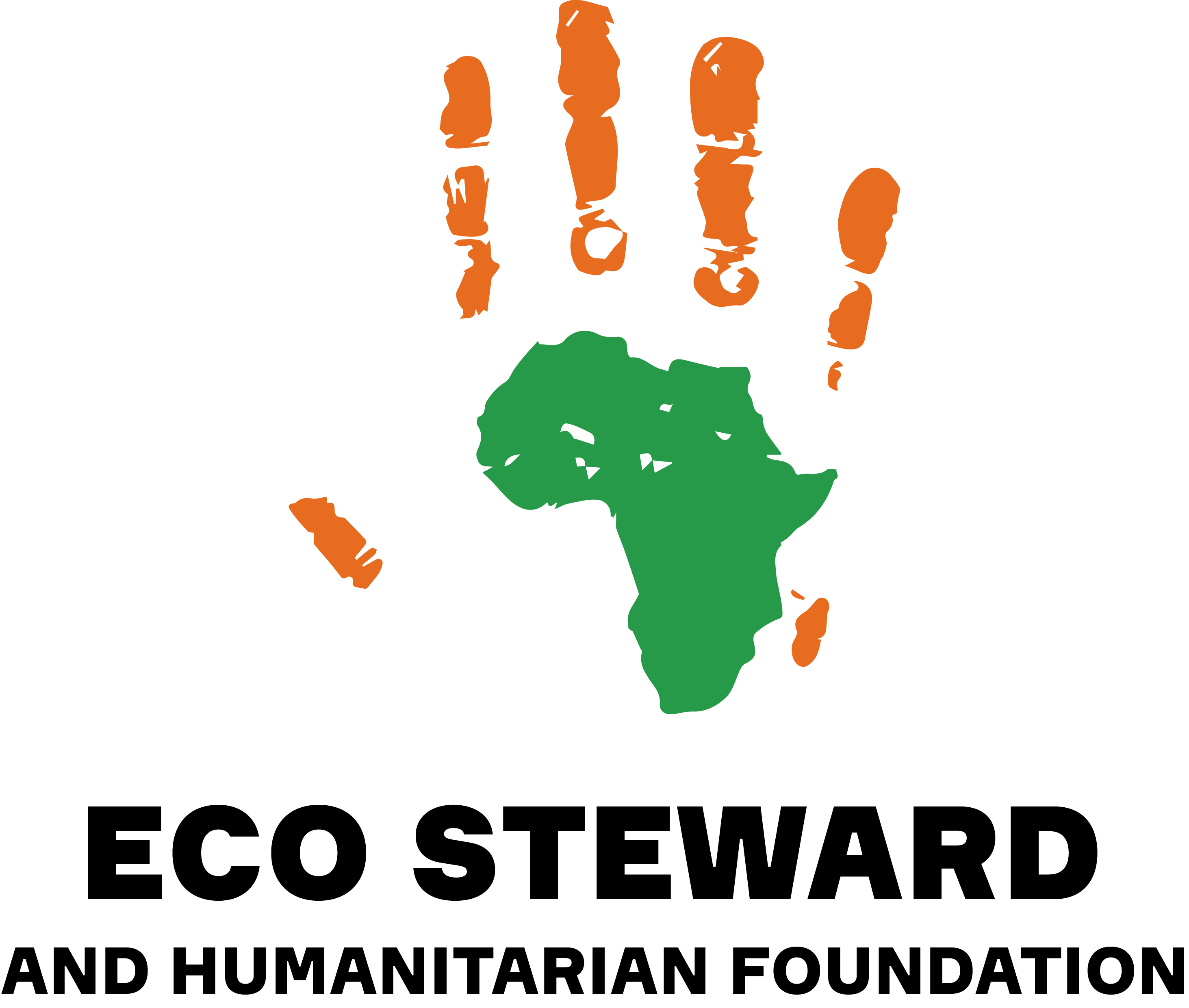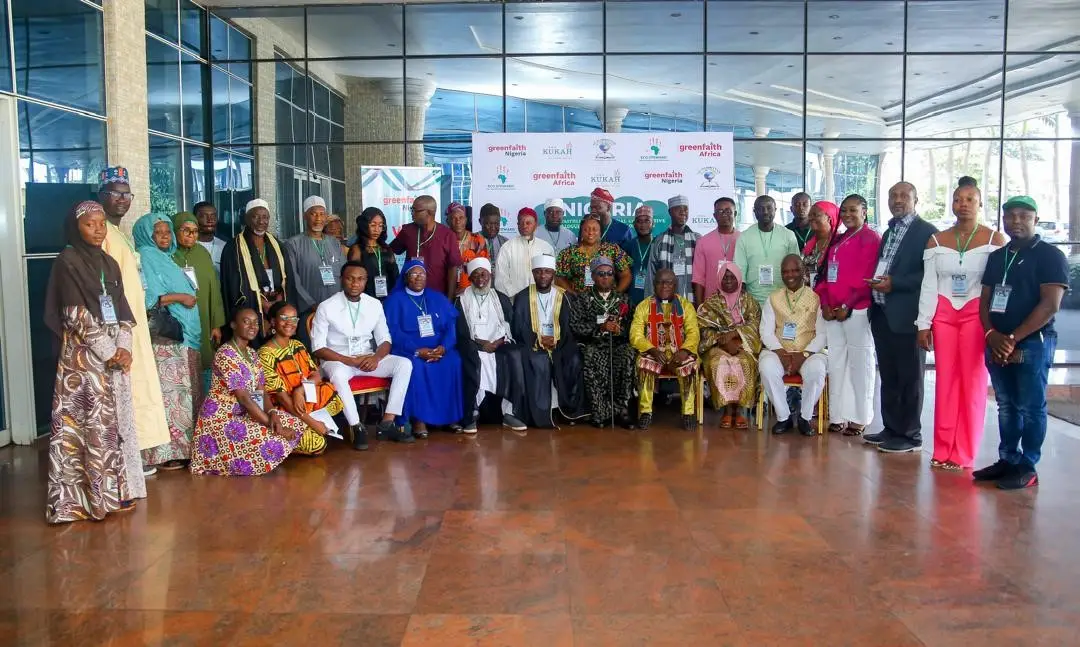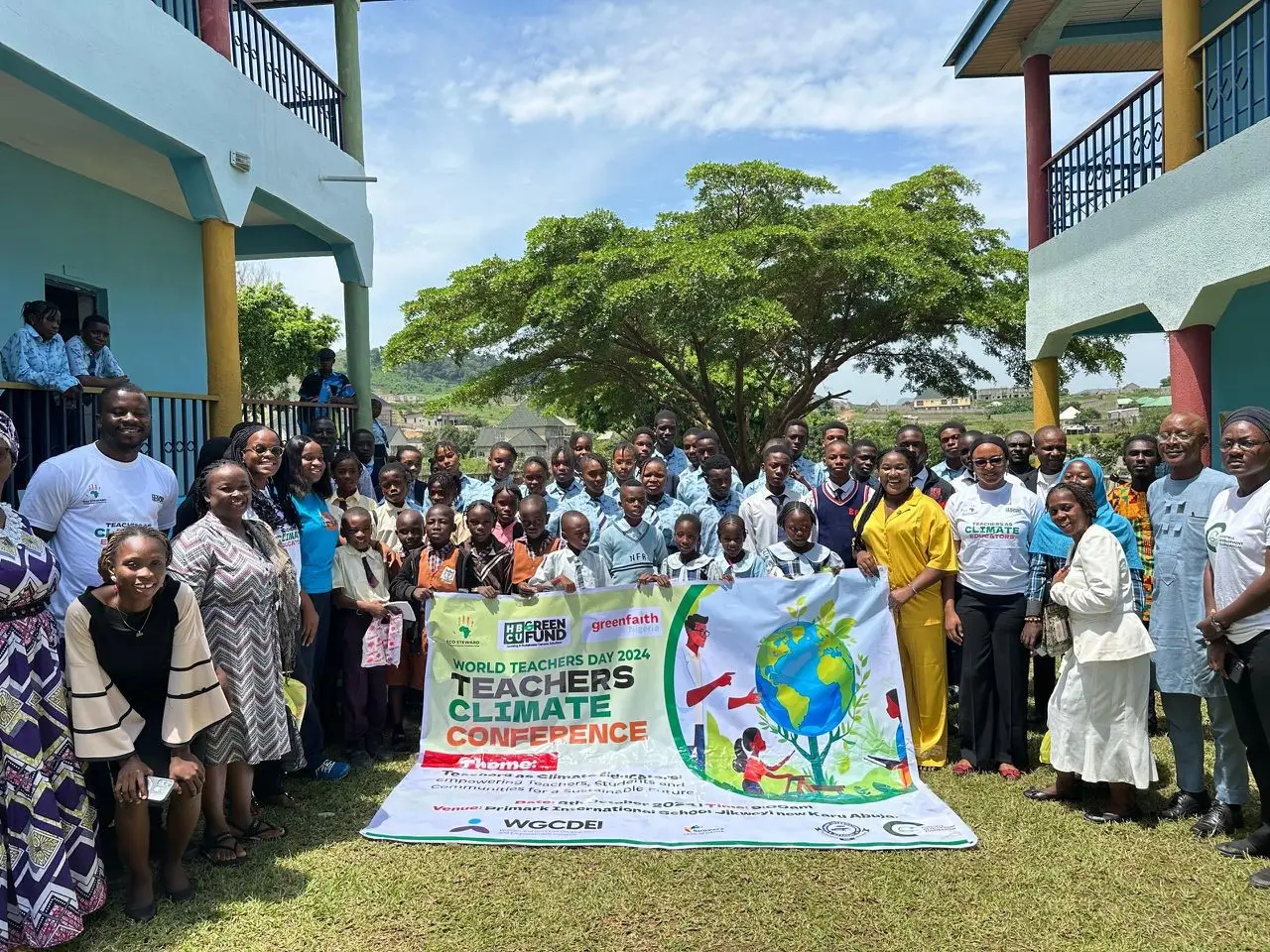Written by Nweze Emmanuel Obinna Faith leaders from diverse communities in Nigeria have called upon the government to prioritize justice and equity in implementing the country’s energy transition program. This appeal emphasizes safeguarding the environmental and health rights of communities affected by the harmful consequences of fossil fuel activities. During a two-day Multi-Faith Leaders National Consultative Dialogue on Medium and Long-Term Climate Goals, organized by GreenFaith Nigeria in collaboration with Eco Steward and Humanitarian Foundation (EHF), GreenFaith Africa, The Kukah Centre, and Al-Habibiyyah Islamic Society, the leaders urged corporations such as Shell, ENI, TotalEnergies, and CNOOC to address the environmental damage caused by their operations. They demanded these companies take responsibility for cleanup, provide reparations, and cease harmful exploration activities. In a unified statement, the faith leaders declared:“We, representing diverse religious traditions from Nigeria’s six geopolitical zones—Christians, Muslims, Hindus, and traditional communities—speak as one on the urgent need for a fair transition from fossil fuels to renewable energy, ensuring a sustainable future for all Nigerians.” The Ecological and Social Toll of Fossil Fuels The group highlighted the devastating environmental and social consequences of fossil fuel exploitation, which exacerbates climate change, fuels biodiversity loss, and results in widespread land contamination. These activities displace communities, disrupt livelihoods, and trigger human rights violations and conflicts. Since the discovery of fossil fuels in Nigeria and other African nations, the benefits to local populations have been minimal. Overbearing influences from international corporations, financial institutions, and foreign governments, coupled with weak regulatory frameworks and corruption, have deprived African nations of equitable gains. Compounding the issue, over 85% of the fossil fuels extracted from Africa are exported, hindering the continent’s energy development and perpetuating poverty. A Call for Spiritual and Environmental Responsibility Faith leaders emphasized that protecting the environment aligns deeply with spiritual teachings. Across religions, safeguarding creation and promoting justice are sacred duties, as articulated in holy scriptures. These obligations require adherents to respect the sanctity of the Earth and ensure the well-being of future generations. The leaders urged government and international collaborators to uphold these principles in executing energy transition strategies. They proposed a Nine-Point Agenda, stressing the inclusion of local communities and faith leaders in decision-making, equitable access to renewable energy, and public education to foster a green future. Key Demands and Actions Among their core demands were: Voices of Leadership and Commitment Pius Oko, Program Manager at GreenFaith Africa, commended the collective resolve of the faith leaders, saying:“We are not only envisioning a better future but are committed to taking bold steps to bring that vision to life. Our shared faith and commitment to justice drive us toward a renewable and equitable future.” Similarly, Rev. Fr. Atta Barkindo, Executive Director of The Kukah Centre, painted a poignant picture of the Niger Delta’s plight, stating:“Our lands, once fertile, now bear the scars of exploitation. Oil spills poison our waters, gas flares darken our skies, and communities are fragmented by environmental degradation and inequality. This unsustainable path betrays our sacred duty as stewards of creation.” Imam Faud Adeyemi, Chief Imam of Al-Habibiyyah Islamic Society, underscored the pivotal role of faith leaders, describing them as pillars of trust and moral guidance in their communities. He emphasized the need for faith leaders to champion a clean energy future actively:“We must lead by example, guiding our communities toward hope and transformation. This journey requires courage, compassion, and collective effort.” Meryne Warah, Global Director of Programs at GreenFaith, highlighted the critical role of advocacy and awareness, urging faith leaders to leverage their influence to raise issues affecting vulnerable communities. A Path Forward For Nigeria to achieve its energy transition goals, faith leaders must act as stewards and educators, promoting environmental responsibility and social justice. Their advocacy ensures that the transition reflects the values and aspirations of all Nigerians, leaving no one behind. The dialogue reaffirmed the belief that an inclusive and just energy transition is attainable. With cooperation, compassion, and trust, Nigeria can pave the way for a renewable future that aligns with the principles of fairness, equity, and sustainability.
ECOSTEWARD, HBCU, GREENFAITH NIGERIA AND OTHER PARTNERS CELEBRATES THE WORLD TEACHERS DAY, CHARGES TEACHERS TO TAKE LEAD IN CLIMATE EDUCATION AND ADVOCACY.. written by Nweze Emmanuel Obinna
WORLD TEACHERS DAY 2024 CONFERENCE . Written by Nweze Emmanuel Obinna Ecosteward and Humanitarian Foundation in partnership with Ecocykle foundation, Sauvers Lead Initiative, Women and Girl Child Development Initiative and with support from HBCU Green Fund, held a Teachers climate conference in commemoration of the world teacher’s day at Primark International School Jikwoyi FCT Abuja. The conference which was to celebrate the incredible contributions of teachers worldwide, those who inspire, nurture, and guide our future generations. As well as build their capacity on climate change knowledge and motivate them to be champions of climate literacy, brought together teachers and students from different schools. Mr Nweze Emmanuel, the Program Director for Ecosteward Foundation in his remarks stated that we face the pressing realities of climate change. The world looks to our educators to help prepare young minds for the challenges ahead. Climate education is no longer optional—it is essential. It is through education that we can raise awareness, foster critical thinking, and empower students to become responsible stewards of the environment. Mr Nweze emphasized that teachers are at the heart of this transformation. They have the unique opportunity to mould young hearts and minds, to instil a deep respect for the planet, and to inspire actionable solutions to climate challenges. By integrating climate science, sustainability practices, and eco-consciousness into their classrooms, teachers can empower the next generation to lead with responsibility, compassion, and innovation. Pius OKO, the GreenFaith Africa Program Manager Pius OKO, the GreenFaith Africa Program Manager, In his presentation remarked that on this World Teacher’s Day 2024, we honor the incredible contributions of teachers, who, in their roles as climate educators, are now at the forefront of one of the most critical challenges of our time—climate. He highlighted that this year’s theme, “Teachers as Climate Educators,” reflects a powerful truth: teachers are the architects of our collective future. They hold the responsibility of equipping our youth with not only academic knowledge but also the values and skills to navigate the complexities of climate change. By doing so, teachers inspire young minds to recognize the importance of environmental stewardship and foster the courage and innovation necessary to drive sustainable solutions. Mr. OKO further emphasized that, at GreenFaith, climate education is recognized as a crucial step in advancing climate justice, particularly in communities most vulnerable to the devastating impacts of climate change. By leading their students to embrace ecological responsibility, educators are shaping a generation of climate-conscious leaders dedicated to safeguarding our planet. Miss Laureta Boniface, the co-founder Ecocykle Foundation in her presentation stated that this inaugural Teacher’s Climate Conference held in the Federal Capital Territory (FCT), Abuja has made great strides in promoting climate education in Nigeria. The event, which brought together educators and students from various schools, geared a crucial session on Circular Economy and Climate Change led by Ecocykle. Miss lauretta pointed out the importance of equipping Nigeria’s teachers and students with the knowledge and skills necessary to address the pressing challenges of climate change through innovative approaches to sustainable living, including waste management, recycling, and eco-friendly items as a key strategy for mitigating and adapting to climate impacts. The success of the event has prompted calls for similar initiatives to be adopted and implemented in other states across Nigeria exacerbating a culture of climate awareness among teachers and students she stated The principal Primark International School, Sir Oko Agaji in his closing remark thanked the organizers stating that climate change is affecting every aspect our livelihood and there is need for more awareness even within the education sector. While thanking the organizers for the initiative, Mr Oko emphasized that as leaders in education, our influence extends far beyond the classroom. we have the power to cultivate an environmentally aware and resilient generation—one that is prepared not only to adapt to climate change but to lead the charge in addressing it. Together, we can build a future where sustainability and environmental responsibility are at the core of every community.
Ecosteward Foundation empowers Bauanchor Community to champion forest conservation and protect the Cross River Gorilla.
Ecosteward Foundation team engaging Bauanchor Community and youths on forest conservation The conservation of nature transcends scientific pursuit; it embodies a profound moral and existential duty to safeguard life on Earth. As the consequences of deforestation, climate change, and biodiversity loss intensify, the need to preserve the last remnants of our natural ecosystems grows ever more urgent. On 18 May 2024, the Ecosteward Foundation in partnership GreenFaith Nigeria embarked on a community entry and advocacy mission to the forest-dependent communities of Afi and Mbe Mountains, located within Bauanchor and Mbe Mountain Communities, Boki Local Government Area, Cross River State, Nigeria a region globally acclaimed as a biodiversity hotspot and the last refuge of the critically endangered Cross River Gorilla (Gorilla gorilla diehli) and other mammals. A Vital Ecosystem Under Threat The Afi–Mbe mountain range represents one of the last remaining strongholds of Nigeria’s primary rainforest, part of the nation’s dwindling 50% intact forest cover. These lush tropical forests serve as biodiversity reservoirs, harboring chimpanzees, drills, forest elephants, and numerous bird species. Beyond their ecological value, these forests act as natural carbon sinks, mitigating climate change and ensuring water security for surrounding communities. Local community members participating in forest protection dialogue However, this vital ecosystem is gravely threatened by illegal logging, unsustainable land use, deforestation, and hunting. The destruction of forest habitats poses a direct existential threat to the Cross River Gorilla, the rarest and most endangered gorilla subspecies on Earth with fewer than 300 individuals remaining. Their survival is intricately linked to the fate of these highland forests that straddle Cross River State and neighboring Cameroon. Ecosteward Foundation’s Commitment to Biodiversity Conservation In partnership with local leaders and forest users, Ecosteward Foundation’s advocacy efforts seek to strengthen awareness of biodiversity conservation, sustainable resource management, and community-led environmental stewardship. During community engagement sessions, Dr. Pius Oko, Convener of Ecosteward Foundation, underscored the ecological, economic, and cultural significance of preserving natural ecosystems. Forests, he emphasized, provide invaluable ecosystem services clean air, fertile soils, water purification, and climate regulation while sustaining traditional livelihoods through medicinal plants, food resources, and materials essential to indigenous and rural life. Ecosteward’s advocacy extends beyond awareness creation; it calls for collective action and behavioral transformation. The Foundation encourages communities to adopt inclusive conservation models, discourage illegal logging, and embrace ecotourism initiatives that generate income while protecting habitats. This participatory approach ensures that conservation is community-driven, empowering local people as custodians of their environment. The Cross River Gorilla: A Symbol of Shared Responsibility Furthermore, Dr. Pius Oko emphasized that the Cross River Gorilla serves as a profound symbol of humanity’s interconnectedness with nature an emblem of resilience, coexistence, and shared destiny. The species’ continued existence reflects the ecological health of Nigeria’s forests and, by extension, the sustainability of human life itself. To protect this iconic primate is to preserve an entire ecosystem of interdependent species that underpins our collective future. The mission to safeguard the gorilla’s habitat aligns with global environmental frameworks, notably the Convention on Biological Diversity (CBD) and the United Nations Sustainable Development Goals (SDGs), specifically Goal 13 (Climate Action), Goal 14 (Life Below Water), and Goal 15 (Life on Land). The conservation of the Afi–Mbe–Okwangwo forest landscape is, therefore, not only a national responsibility but also a global moral imperative for the preservation of life on Earth. Mbe Mountain rainforest; one of Nigeria’s last pristine tropical forests Ecosteward Foundation envisions a future in which local communities are empowered as custodians of their natural heritage, embracing conservation as a shared societal value rather than an imposed obligation. Realizing this vision demands strategic collaboration among community stakeholders, conservation organizations, and government institutions to curb illegal forest activities and promote sustainable resource management. Long-term success depends on continuous environmental education and capacity building for forest-dependent populations, the creation of sustainable livelihood alternatives that reduce pressure on forest resources, strict enforcement of policies against illegal logging and wildlife poaching, and increased investment in research and monitoring of gorilla populations and overall forest ecosystem health. Conserving nature for humanity transcends environmental advocacy—it is an ethical pursuit of justice for both people and the planet. The Afi and Mbe Mountains, more than mere wildlife habitats, stand as the lungs of our nation and a living legacy for future generations. As Ecosteward Foundation continues to advance biodiversity conservation, environmental education, and community empowerment, one truth endures: the fate of the Cross River Gorilla and other wildlife species is inseparable from that of humanity itself—protecting them is, ultimately, protecting our shared future. Cross River rainforest ecosystem in Afi Mountain Wildlife Sanctuary


